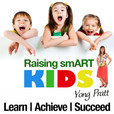
Summary: For the past several weeks, we’ve been discussing study strategies for each of the 8 Multiple Intelligences (Howard Gardner and the blog post of Adam Sicinski). To recap, each of us has 8 distinct types of intelligences that come in to play depending on the circumstances or learning experiences we encounter. Unique to each of are the dominant intelligences that make us who we are. For me personally, I am very much a kinesthetic and visual learner. I need to see and do to make learning relevant and long-lasting for me. Today we are going to explore Intrapersonal Intelligence or what is commonly referred to as being Self-smart. Intelligence Identification How do you identify a self-smart child? If your child enjoys in activities such as self-talk, visualizing, goal setting, working on his own, day dreaming, following their intuition, journaling, solitude, personal analysis, reflection and self-assessment, then you have a Intrapersonally Intelligent Child or Self-smart child. Self-smart individuals help to advance our world through deep reflection and insight that helps expand how we think about life, society, the environment and ourselves. Here are some examples of careers for the self-smart: Inventors, entrepreneurs, psychologists and life coaches Success Strategies: Commit to the strategies and don’t judge them. Allow your kids to try them all and discover the ones that are most relevant to THEM, not you. The following study strategies are designed to increase your child's ability to learn and remember info more readily as well as adding variety and creativity to study sessions. Empower your self-smart kids by giving them space. Creating special (sacred places) to study is a must. . Here are 2 study strategies that you can use with your Self-Smart Child 1. Effective Questioning Albert Einstein said “Learn from yesterday, live for today, hope for tomorrow. The important thing is not to stop questioning.” This is especially relevant for those that exhibit Intrapersonal Intelligence. Knowing how to ask the right questions is key. Prepare a list of questions that will help your child gather a deep insight about any topic Pay attention to any personal feelings and motivations regarding the topic. Questions must add to current knowledge as well as challenge new learning. Here are some personal reflective questions to get you started: Why should I learn this? How is this of significance? How can I apply this into my life? How will learning this change me? How does this fit in with what I already know? 2. Personal Reflection and Visualization Reflecting and visualizing on the learning process (before, during, and after) is an important step to understanding. Questions such as: Has the study session been productive? What could be done better? What went well? Have I grown from learning this topic? Self-reflection and understanding is an absolutely essential component of the accelerated learning process that you simply cannot do without. Taking this process for granted may be detrimental to learning for your self-smart child. Implement these study strategies for your Self-Smart Child this week and see what new discoveries are made!
